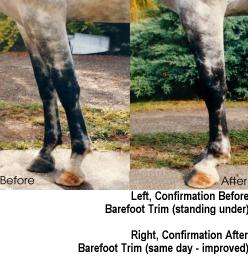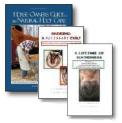

|
A r t i c l e s A n d C a s e
S t u d i e s
What Is The Barefoot Method?
The Barefoot Method is an holistic approach to equine management, where the horse is
kept in natural living conditions and hooves are trimmed with a physiologically correct trim to obtain optional and
natural hoof form. The Barefoot Method involves 24 hour turnout with adequate shelter and
herdlife, no stabling or yarding, no rugs or wraps, and no shoes, combined
with a physiologically correct "barefoot" hoof trim.
Willie, 18 year old tb, much improved after just a few Natural Hoof trims.
The "Barefoot" or Natural Hoof Trim
The specialised "barefoot" trim allows optimal hoof mechanism (expansion of the
hoof), superior circulation, traction, shock absorption, and much more for your
horse. It also allows healing of any damage caused by lack of hoofcare,
incorrect hoof trimming, or shoeing of any horse, irrespective of background,
current condition or breed.
Effects of Shoeing
Shoes do not allow your horse's hooves to properly expand when weightbearing. This
impaired expansion of the hoof reduces circulation and shock absorption, and
promotes incorrect hoof form, causing many hoof and general health problems.
Unshod vs Barefoot - there's a big difference
Simply removing the shoes or applying a conventional pasture trim is often not
enough to allow horses to be restored to optimal health and ridden without shoes
successfully and to their full potential. This is because conventional ideas
about hoof form are not based on the natural hoof form of a wild horse.

Natural hoof form is essential for optimal equine health and performance. Hoof
problems, such as cracks, brittleness, seedy toe, thrush and navicular are the
result of incorrect hoof form. Horses that don't have natural hoof form will
not be able to perform to their full potential and often have problems such as
poor health and condition, poor confirmation (see photo above), muscle tightness
and back and joint pain.
Transition To Barefoot
All horses can be ridden as usual without shoes once the hoof is returned to
it's natural form. Depending on the condition of the hooves, some horses will
need special management during transition to barefoot. This includes a programme
of regular correct barefoot trimming, use of hoof boots while riding to prevent
incorrect wear, and possibly some form of natural therapy. Once the hooves have
returned to their natural form, (which can take weeks to years), the horse can
be ridden over any terrain it is conditioned for with superior balance, traction
and performance.
Can horses really perform barefoot?
Most horse owners understand that metal horse shoes are damaging to the hooves and the rest of the horse - horseshoes are traditionally considered a "Necessary Evil". However, as many horse owners in New Zealand and around the world are discovering, there is a way to successfully go without horseshoes and have your horse perform in any discipline - usually with much better results than when shod.
Horses Can Perform Without Shoes
In the past, it was traditionally thought that horses could not manage the work we asked of them without horse shoes because their hooves would wear excessively. Hence the theory that "if a horse is in work, it needs to be shod". This is probably true in many cases if you keep your horse traditionally and give it a hoof trim meant for the application of a shoe.
If, however, you give your horse a barefoot trim by a natural hoofcare professional, and provide correct living conditions that meet the basic biological needs of the horse, you can successfully return your horse to full health, and go barefoot over any terrain that you condition your horse for, with improved overall health, traction, movement and performance.
Barefoot Success
There are horse owners throughout New Zealand and the world who regularly compete with barefoot horses in 100km endurance rides over varied terrain, and their horses actually perform better than when shod. There are also others in NZ who are competing at all levels in
dressage, showjumping, showing, trekking, natural horsemanship - even hunting in mud and snow successfully barefoot.
The Barefoot Method
But it's important to realise that it's not simply a matter of removing the shoes in order to get this kind of success. The correct barefoot method must be used. The barefoot method involves a physiologically correct barefoot hoof trim combined with natural living conditions for your horse.
Healing Hoof Problems using the Barefoot Method
A correct barefoot trim and natural living conditions also prevents and heals such problems as founder, laminitis, navicular, thrush, ossifications such as sidebone and ringbone, hoof cracks, brittle hooves and other common ailments common when horses have been shod or trimmed traditionally. For evidence of this, visit our articles section, where it is demonstrated that such complaints are healed using the barefoot method, or contact a natural hoofcare provider for more information. An ideal strategy is to use the barefoot method from a young age, preferably young foals, so that these traditional problems do not occur.
Where Do I Start?
There's something in this barefoot method, something worth exploring further to guarantee your horses health, performance and longevity. It's recommended that the first place to start is the Natural Hoof "articles" section, and Dr Strasser's book "A Lifetime Of Soundness", which takes you through the whole barefoot philosophy. The next step is then to find an experienced natural hoofcare provider to give an assessment of your horse.
Disclaimer: Natural Hoof
reserves the right to change or edit any part of
all articles and case studies submitted to this
website. Natural Hoof does not take any
responsibility for the content of any articles
and/or case studies and/or any misapplication of the information presented in any articles. Natural Hoof presumes readers consult a professional for more information about any topic covered in any Natural Hoof article.
Home | Articles | Study Groups | Clinics-Events | Brag | Classifieds |
Order | Links


|
|

Recommended Reading

|











